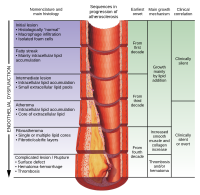
Photo from wikipedia
The diagnostic value of microRNA-377 (miR-377) in patients with acute coronary syndrome (ACS) and explored miR-377's potential mechanisms. We performed an qRT-PCR to assess serum miR-377 levels in ACS patients… Click to show full abstract
The diagnostic value of microRNA-377 (miR-377) in patients with acute coronary syndrome (ACS) and explored miR-377's potential mechanisms. We performed an qRT-PCR to assess serum miR-377 levels in ACS patients and coronary artery ligation rat models. The diagnostic value of miR-377 was evaluated by determining the ROC curve. An ELISA assay was conducted to detect the model rat endothelial damage markers von Willebrand factor (vWF) and heart-type fatty acid binding protein (H-FABP), and proinflammatory cytokines TNF-α, IL-6, and IL-1β. The serum miR-377 level was elevated in the ACS patients and significantly increased in the ACS rats. MiR-377 has a high diagnostic value in ACS patients, with a 0.844 ROC, 76.47% specificity, and 87.10% sensitivity. MiR-377 was positively correlated with the expressions of vWF, H-FABP, cTnI, TNF-α, IL-6, and IL-1β. In ACS rats, reducing the expression of miR-377 significantly inhibited the increases in vWF, H-FABP, TNF-α, IL-6, and IL-1β. An elevated miR-377 level can be used as a diagnostic marker in patients with ACS. A reduction of miR-377 may alleviate ACS by improving myocardial damage such as endothelial injury and the inflammatory response.
Journal Title: Acta medica Okayama
Year Published: 2022
Link to full text (if available)
Share on Social Media: Sign Up to like & get
recommendations!